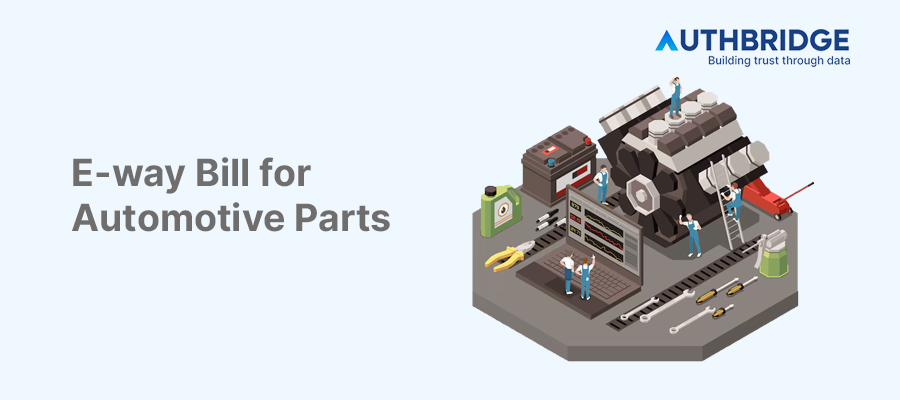Driving Efficiency: Navigating E-way Bill Compliance In The Automotive Parts Sector

The automotive sector, a pivotal component of the Indian economy, encompasses a vast network of manufacturers, dealers, and suppliers of automotive parts. The introduction of the E-way Bill under the Goods and Services Tax (GST) regime has been a game-changer for this sector, particularly for automotive parts dealers.
Significance of E-way Bill for Automotive Parts Dealers
The E-way Bill system mandates the generation of an electronic bill for the movement of goods worth more than Rs. 50,000. For automotive parts dealers, this system ensures a transparent and efficient mechanism for tracking shipments, thereby reducing the chances of tax evasion and improving compliance.
Overview of the Automotive Parts Sector in India
India's automotive parts sector is characterized by its diversity, catering to domestic and international markets. It includes a wide range of products, from engine parts to electrical components. The sector's growth is propelled by the increasing demand for vehicles and the expansion of the automotive manufacturing industry.
GST and E-way Bill Compliance for Automotive Parts
GST Rates on Automotive Parts
The GST rates on automotive parts vary depending on the type of component, generally ranging from 18% to 28%. These rates are crucial for determining the tax liability and the need for E-way Bill generation.
Threshold for E-way Bill Generation
The threshold for E-way Bill generation is the transportation of goods valued over Rs. 50,000. For automotive parts dealers, understanding this threshold is essential for ensuring compliance during inter-state and intra-state transportation.
Generating E-way Bills for Automotive Parts
Step-by-Step Process for E-way Bill Generation
- Registration: Dealers must register on the E-way Bill portal.
- Login: Use GSTIN and the portal password to log in.
- Fill in Details: Enter the details of the consignment, including the consignor, consignee, and invoice details.
- Generate E-way Bill: Submit the details to generate the E-way Bill, which will provide a unique E-way Bill Number (EBN).
Documentation Required for E-way Bill Generation
- GSTIN of the consignor and consignee
- Invoice or bill of supply
- Transporter ID or Vehicle number
Benefits of E-way Bill for Automotive Parts Dealers
Streamlined Supply Chain and Logistics
The E-way Bill system facilitates smoother logistics operations by minimizing the checkpoints and documentation required for the transportation of goods, thereby reducing transit times.
Enhanced Compliance and Reduced Tax Evasion
The digital tracking of goods movement enhances transparency and accountability, leading to improved compliance with tax laws and a reduction in tax evasion.
Challenges and Solutions in E-way Bill Implementation
Common Challenges Faced by Dealers
- Adapting to the digital system
- Managing the documentation for multiple consignments
- Ensuring timely generation of E-way Bills
Solutions and Best Practices for Smooth Implementation
- Training staff on the E-way Bill portal usage
- Utilizing software solutions for automating E-way Bill generation
- Keeping abreast of the latest GST and E-way Bill regulations
Technology Integration: Automating E-way Bill Generation
Software Solutions for E-way Bill Generation
Several software solutions integrate with the E-way Bill portal, offering features like bulk generation of E-way Bills and automatic updates of vehicle numbers.
Integration with Inventory and Billing Systems
Integrating E-way Bill generation with inventory and billing systems can streamline operations, ensuring that E-way Bills are generated automatically upon invoicing.
Future Trends: E-way Bill and the Automotive Parts Sector
Upcoming Changes in E-way Bill Regulations
The government periodically updates E-way Bill regulations to address challenges and improve the system's efficiency. Dealers should stay informed about these changes to remain compliant.
Impact of Technology on Future Compliance
Advancements in technology, such as AI and machine learning, are expected to further automate compliance processes, making E-way Bill generation and management more efficient.
The E-way Bill system has significantly impacted the automotive parts sector, enhancing transparency, compliance, and operational efficiency. As the system evolves, it will continue to shape the logistics and compliance landscape of the automotive parts sector in India.
Category

Abhinandan Banerjee
(Associate Manager - Marketing)
Abhinandan is a dynamic Product and Content Marketer, boasting over seven years of experience in crafting impactful marketing strategies across diverse environments. Known for his strategic insights, he propels digital growth and boosts brand visibility by transforming complex ideas into compelling content that inspires action.



